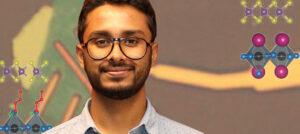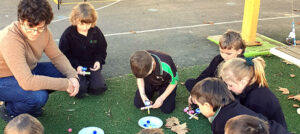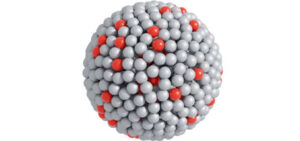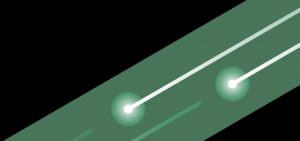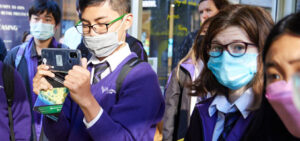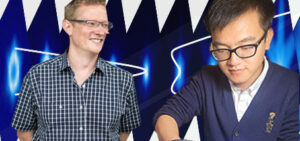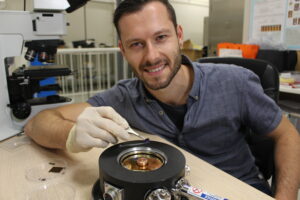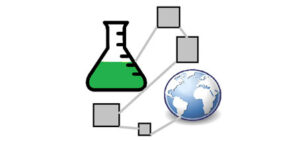Collaborate
Subscription confirmed
 WELCOME TO FLEET NEWS with regular updates from the Australian Research Council Centre of Excellence in Future Low-Energy Electronics Technologies.
WELCOME TO FLEET NEWS with regular updates from the Australian Research Council Centre of Excellence in Future Low-Energy Electronics Technologies.
Each edition of FLEET News brings a selection of research news from around the Centre, a wrap-up of FLEET stories in the media, outreach, and other news regarding FLEET researchers and research.
Catch up on past issues of FLEET News.
Michael Fuhrer
Director, FLEET
ARC Centre of Excellence in Future Low-Energy Electronics Technologies
Following the news
 If you’re on Facebook, Twitter or Linkedin, you can follow our accounts to stay up to date with FLEET news and events. You can also follow news and events at FLEET.org.au.
If you’re on Facebook, Twitter or Linkedin, you can follow our accounts to stay up to date with FLEET news and events. You can also follow news and events at FLEET.org.au.
If a friend or colleague might be interested in our news, send them this link. Or let us know and we’ll invite them.
The challenge
 The big challenge that FLEET is addressing is the increasing energy load of computation, which is currently at least 5% of world electricity use, and doubling each decade.
The big challenge that FLEET is addressing is the increasing energy load of computation, which is currently at least 5% of world electricity use, and doubling each decade.
To date, the amount of energy being burned by computing has been kept in check by a phenomenon known as Moore’s Law, whereby the number of chips in a given area doubles every two years. But we are fast approaching a limit for Moore’s Law.
Current computing is based on semiconductor chips that each burn a tiny, tiny amount of power as they ‘switch’. FLEET will develop switches that will burn almost zero energy, operating at room temperature.
Our research
FLEET will use new concepts for electronic conduction without resistance to create a new generation of ultra-low energy electronics.
We will develop materials in which electricity can flow with minimal resistance and dissipation of heat, and devices in which that electric current can be switched on and off.
FLEET’s three Research Themes are:
- Topological materials (led by Alex Hamilton, UNSW)
- Exciton superfluids (Elena Ostrovskaya, ANU)
- Light-transformed materials (Kris Helmerson, Monash)
And this research is underpinned by two Technology themes:
- Fabrication of atomically thin materials (Xiaolin Wang, University of Wollongong)
- Nanodevice fabrication (Lan Wang, RMIT)
About FLEET

With over $40M investment from the ARC (Australian Research Council) and contributing organisations, FLEET will make a significant global impact in the electronics and energy sectors.
Headquartered at Monash University, and an ARC Centre of Excellence, FLEET has 19 chief investigators at seven Australian institutions, 17 partner investigators at 13 institutions worldwide, and will have over 100 higher-degree research students and postdoctoral fellows.
The highly interdisciplinary team includes some of Australia’s best researchers in atomic physics, condensed matter physics, materials science, electronics, nanofabrication and atomically thin materials.
By building strategic and strong partnerships with Australian and international industry, research institutions and government, FLEET will build capacity for advanced electronics research in Australia and train the workforce for the next generation of electronic materials researchers and future semiconductor industry.
Recent news
Designing hetero-interfaces towards new optoelectronic functionalities using large-scale computations Assembling ‘Lego-like’ 2D ‘heterostructures’ can give rise to emergent properties and functionalities very different from the intrinsic characteristics of the constituents. Density functional theory (DFT)-based band-structure calculations can shed light on interfacial properties of different heterostructures. Interface properties of 2D perovskite/TMD heterostructures Heterostructures based on different 2D materials have resulted in …
QUT/FLEET researcher A/Prof Dongchen Qi has joined forces with an Australian jewellery designer to showcase the brilliance of diamond in medical, scientific, and other applications. Diamond does not naturally conduct electricity, but Professor Qi, from the QUT Centre of Material Science, led research to make it both conductive and controllable as a high-capacity semiconductor. Semiconductors conduct or insulate electrical signals …
Following on from FLEET’s previous trip to the western districts in May, Centre outreach coordinator Jason Major and COO Tich-Lam Nguyen visited Horsham College north of the Grampians to engage year 7 students and pilot-test FLEET’s Forces and Energy workshop. The budding scientists (all 170 of them) built catapults and balloon rockets to explore Newton’s 2nd and 3rd laws and …
Majorana fermions promise information technology with zero resistance A new, multi-node FLEET review investigates the search for Majorana fermions in iron-based superconductors. The elusive Majorana fermion, or ‘angel particle’ proposed by Ettore Majorana in 1937, simultaneously behaves like a particle and an antiparticle – and surprisingly remains stable rather than being self-destructive. Majorana fermions promise information and communications technology with …
In an Exciton Science/FLEET study, researchers have been able to use trace amounts of liquid platinum to create cheap and highly efficient chemical reactions at low temperatures, opening a pathway to dramatic emissions reductions in crucial industries. When combined with liquid gallium, the amounts of platinum required are small enough to significantly extend the earth’s reserves of this valuable metal, …
Semiconductor physics conference, satellite symposium and FLEET workshop It is a wonderful opportunity for Australia’s semiconductor physics community, as Sydney hosts the International Conference on the Physics of Semiconductors (ICPS22, 27-30 June), the premier forum for new semiconductor physics. Nobel Laureates Prof Klaus von Klitzing (Quantum Hall Effect) and Prof Kostya Novoselov (graphene) join an impressive array of 60 international …
Keep discovering and rediscovering yourself Be open to new research and life directions Hi, I am Elizabeth Marcellina, and I was previously a FLEET PhD student and then Research Fellow at UNSW with Prof Alex Hamilton and A/Prof Dimitrie Culcer. My general research directions within FLEET were to harness spin-orbit interactions in semiconductors for spintronics and spin-orbit qubits. To be …
Nobel-winning material science in the classroom Gol Akhgar and Julie Karel (Monash) this month demonstrated graphene exfoliation with scotch-tape in the class, explaining the role of 2D materials in future beyond-CMOS electronics. The lesson is part of FLEET’s ongoing year-10 future electronics unit at John Monash Science School, which builds up from atomic/quantum fundamentals to transistor functions, logic circuits and …
Over the course of Melbourne Knowledge Week last week FLEET volunteers engaged with around 300 visiting members of the public, talking about FLEET’s mission to ensure a sustainable future for computing, with some fun props to demonstrate electromagnetic forces and the role of quantum materials such as superconductors. The bright yellow sustainable computers stall at the new MKW festival hub …
One of the key aims of FLEET is to foster a respectful and supportive workplace that is equitable, inclusive and free from any form of harassment or discrimination. To provide a clear statement of the Centre’s expectations of its members in respect of their professional and personal conduct we have formulated a code of conduct, which can be found online …
FLEET had a bumper crop of seven researchers at STA’s annual Science Meets Parliament (February 2022). Participants heard from some of Australia’s top scientists and science/technology policymakers, as well as connecting with other ECRs. FLEET’s seven ECR delegates—Yik Kheng (RMIT), Mohannad Mayyas (UNSW), Hong Liu (Monash), Krittika Kumar (UNSW), Matt Gebert (Monash), Peggy Schoenherr (UNSW) and Bernard Field (Monash)—were introduced …
Designer heterostructure is a potential high-temperature QAHE, where a topological material is sandwiched between two ferromagnets A Monash University-led research team has discovered that a structure comprising an ultra-thin topological insulator sandwiched between two 2D ferromagnetic insulators becomes a large-bandgap quantum anomalous Hall insulator. Such a heterostructure provides an avenue towards viable ultra-low energy future electronics, or even topological photovoltaics. …
FLEET is an international research institution that is committed to fostering a fair, equitable, and just environment in which to conduct research worldwide. The principles of self-determination, national sovereignty, and peaceful relations among nations are the basic foundation that supports these values. FLEET, therefore, stands in solidarity with its participating universities, the Australian government, and learned societies around the world, …
FLEET’s research fellow Matthias Wurdack has been chosen to represent Australia at the annual Lindau Nobel Laureate Meeting this year. Matthias will be among six early-career Australian scientists attending the 71th Meeting of Nobel Laureates in Lindau, Germany, 26 June – 1 July 2022. The 71th Lindau Nobel Laureate Meeting will be dedicated to chemistry, expected to be attended by around …
“Inventions and new products come from combining novel and existing technologies” (Joseph Schumpter) What is ‘translation’ anyway? And what are the benefits for me / my work? Does this apply to my work? Will industry be interested in what I’m doing? (Spoiler: Yes it does! Matt Davis explains quantum weighbridges) How can FLEET help me do this? A FLEET audience …

